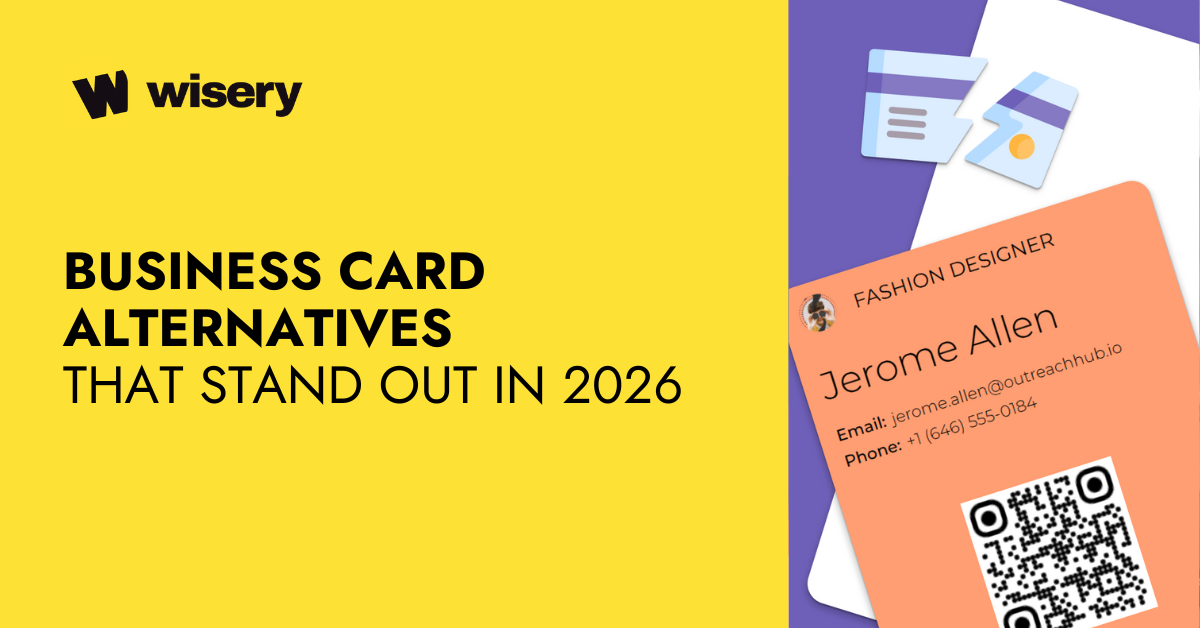
Business Card Alternatives That Stand Out in 2026
Getting someone’s attention in 2026 is a full-time job. Everyone is online, everyone has tools, and everyone is trying to make an unforgettable impression. That includes your business card. What used to be a small rectangle with your name and number now has to do the most. So, if you want your business card to actually get noticed, remembered by potential customers, and shared, you have to go beyond the traditional.
This article is your guide to over 20 business card alternatives that aren’t just different for the sake of it — they’re strategic, smart, and designed for modern networking.
Before we dive in, here’s a quick disclaimer: each idea we list here is an alternative to business cards that someone, somewhere, has used with great success. But what works for one brand might not work for another. Consider all the pros and cons before you commit.
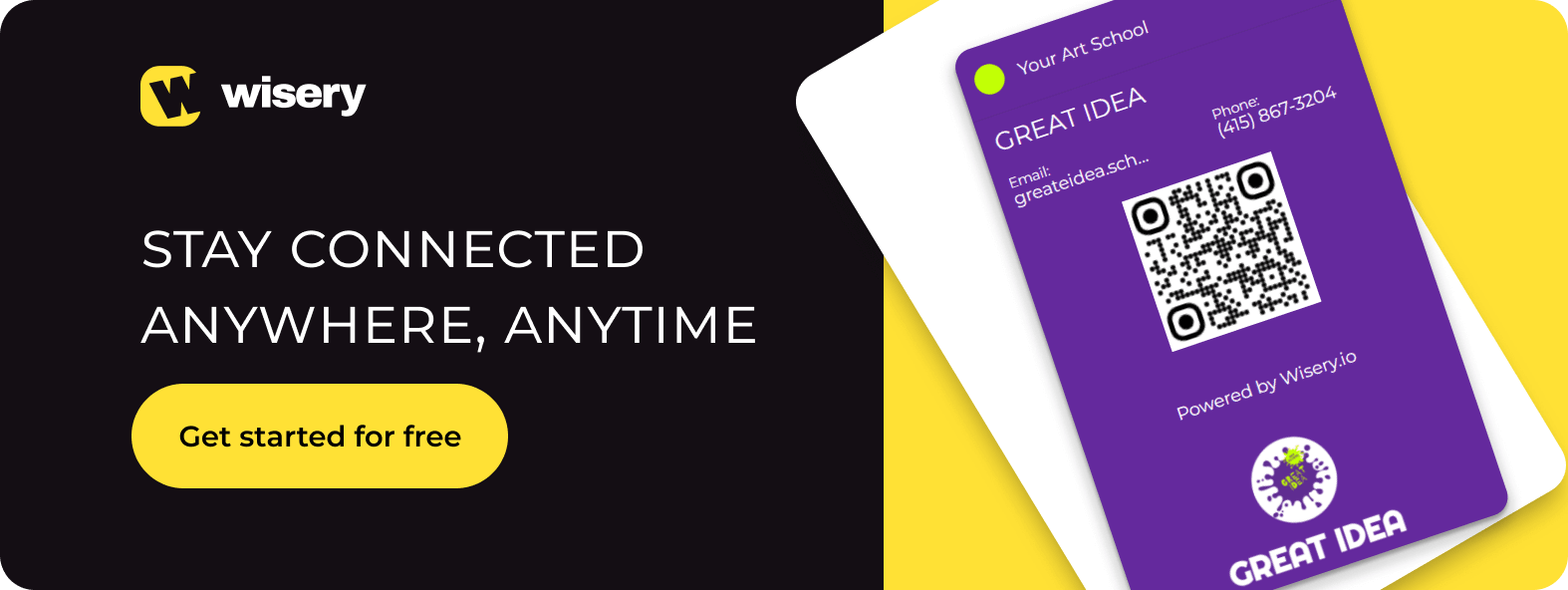
Contents:
- Top 3 Digital Business Card Alternatives for Modern Networking
- Smart Tech-Driven Business Card Alternatives
- Eco-Friendly alternatives to traditional business cards
- Creative & Conversation-Starting Cards
Top 3 Digital Business Card Alternatives for Modern Networking
We’ll start with the fundamentals. These are the most widely adopted, easy to use, and deliver great value for money. Each alternative business cards in this section has been proven to leave a lasting impact at any networking event. Plus, they’re easy to customize and share contact info instantly.
Digital Business Cards
Going digital is the fastest way to modernize your business. Digital business cards are optimized for smartphones and desktops and are fully interactive. These cards reside in your digital wallet or browser and can be shared via QR code, link, or tap.
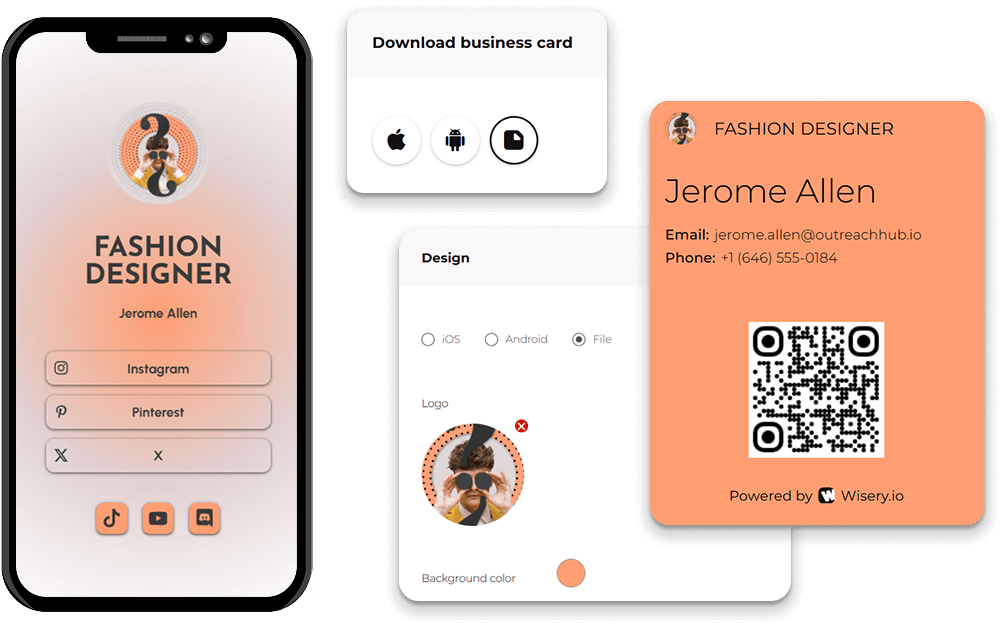
Why digital business cards stand out
- Always with you: No need to carry paper.
- More data: Add videos, social links, documents, and more.
- Lower printing cost: Since there’s nothing to print.
- Easy to customize and update in real time.
- Great for tracking and analytics.
Limitations to keep in mind
- Getting used to the switch: If you’re used to printing cards, it might take a moment to adjust to sharing a link or QR code.
Top platforms to get started
We recommend Wisery. It’s beginner-friendly and offers all the basic features you need to create a standout digital card. At a networking event, it’s your best chance to make a lasting impression.
Estimated pricing
Start free. Upgrade to Pro for $2.99 per seat/month (billed annually) to unlock custom branding features and ease of sharing.
QR Code Business Cards
This is a physical-digital hybrid. Your paper business card features a QR code. When scanned, it leads to a full profile with your contact details, social links, portfolio, or booking form. The digital card behind it does the work, while the paper acts as a trigger.
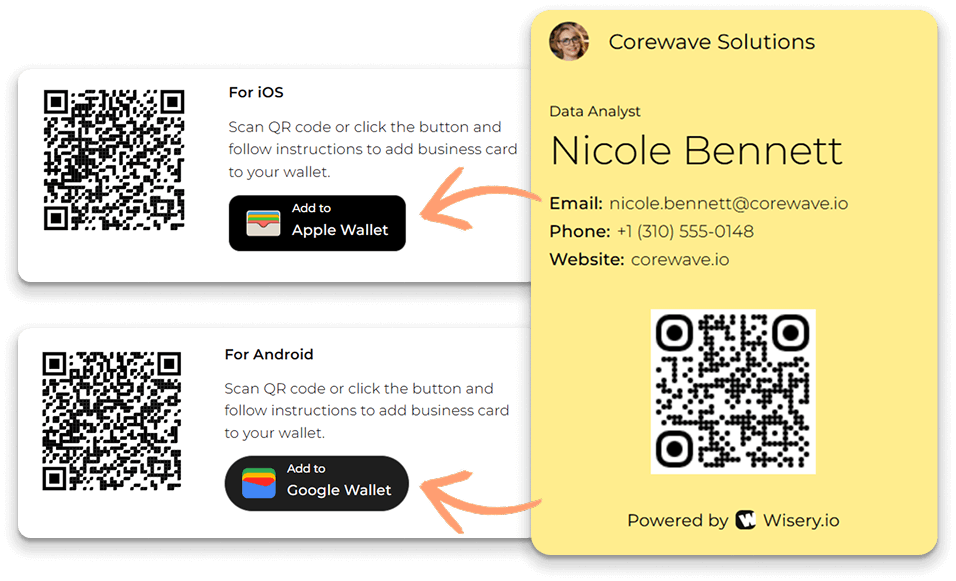
Why QR code business cards stand out
- Combine traditional and tech.
- Keep the look and feel of a physical card.
Limitations to keep in mind
- The design may limit the size of the QR code.
Top platforms to get started
Again, we suggest Wisery for its simplicity. You can also explore Blinq, HiHello, and Uniqode. All these offer good flexibility, but Wisery lets you generate QR codes even on the free plan.
Estimated pricing
Free to start. Pro plan: $2.99 per seat/month, billed annually.
NFC Business Cards
NFC-enabled cards use NFC technology — the same one you use to tap a card to pay. Just tap your NFC business card on someone’s mobile device, and your contact info appears.
Why NFC cards stand out
- One tap sharing.
- No need for apps.
- One card can be reused forever.
Limitations to keep in mind
- Some devices don’t support NFC.
- Doesn’t work well through metal or thick cases.
- It can be more expensive upfront than a paper business card.
Top platforms to get started
Wisery doesn’t support NFC yet (we’re working on it), but you can try other alternatives like Wave, DOT, and Linq.
Estimated pricing
Typically, between $5 to $20 per card.
Smart Tech-Driven Business Card Alternatives
Now, let’s get into the exciting stuff. These alternatives to business cards bring serious tech flair and work well in creative industries. If your brand values design, innovation, and engagement, these are for you. They focus on the interactive experience, not just the basic contact details.
Augmented Reality (AR) Business Cards
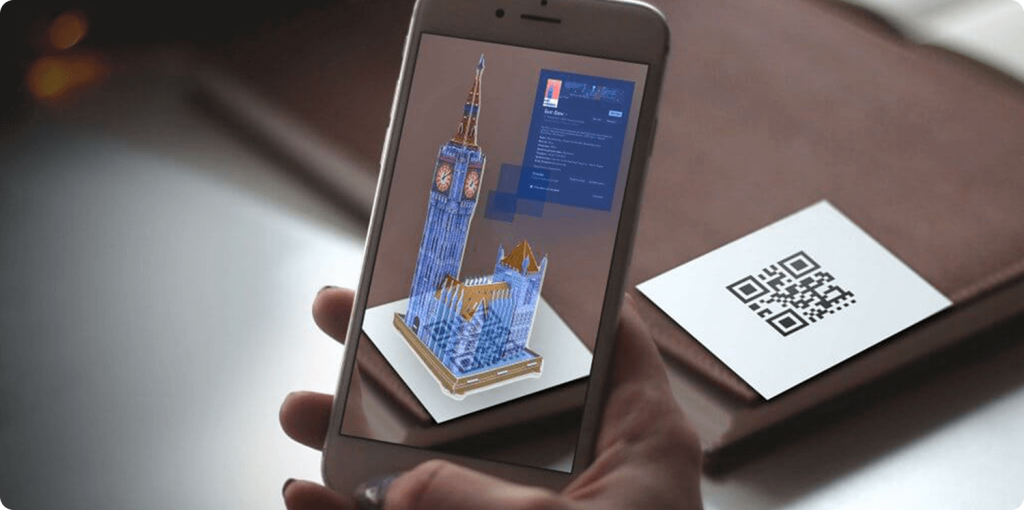
Source: ZealAR
Think of this as a traditional card that comes to life. With AR, your recipient scans the card and sees a 3D animation, video message, or live demo overlay. It’s immersive, unforgettable, and brings an actionable tool to the front. Perfect for: real estate, gaming, architecture, or any visually driven business.
Pros:
- Hyper-personalized experience.
- Makes your physical card feel futuristic.
- Adds intricate design without clutter.
Limitations:
- Requires development and hosting.
- Heavy on mobile storage and bandwidth.
- Not every user will be tech-savvy enough.
Top platforms to get started: BlippAR, MyWebAR, Vossle
Estimated pricing: Cards cost around $2 to $5, but AR experiences range from $1,000+ for basic to $50,000+ for advanced custom builds. Consider what level of interaction your brand needs before investing
Video Business Cards
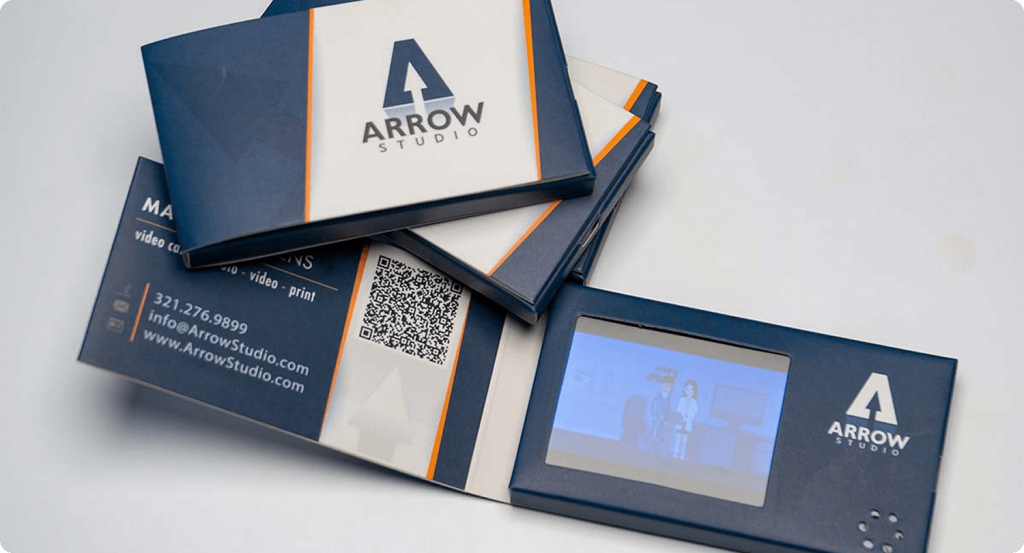
Source: theVideoCards
These are tiny digital screens embedded into a physical card. When opened, they auto-play a video. You’ve probably seen them in high-end pitch decks.
Pros:
- Perfect for presentations and pitches.
- Standout choice for industries like real estate, fashion, or tech.
- Signals premium branding.
Limitations:
- Not easily shared or duplicated.
- Might be too much for casual connections.
Top platforms to get started: TheVideoCards, PrintAVizion, Video Plus Print
Estimated pricing: $25 to $100 per card, depending on screen size and memory
Hologram Business Cards
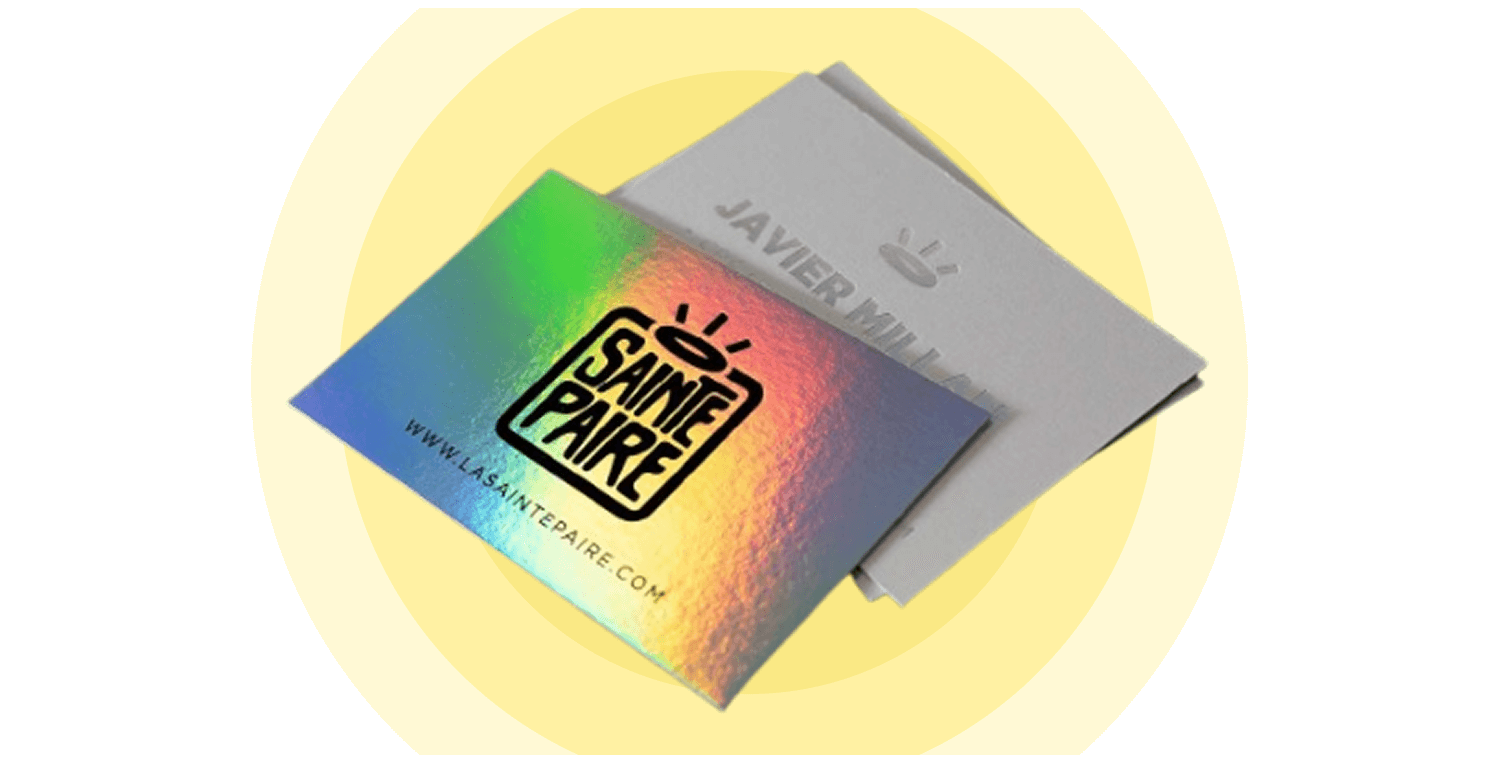
Source: AfterHoursCreative
These cards use light to project a mini 3D image, logo, or animation. It’s engaging and makes the simple act of receiving a card fun.
Pros:
- Adds depth to look and feel.
- Fits industries like luxury, fashion, and tech.
Limitations:
- Design space is limited.
- Harder to mass-produce.
Top platforms to get started: Zazzle
Estimated pricing: $5 to $15 per card
USB Business Cards
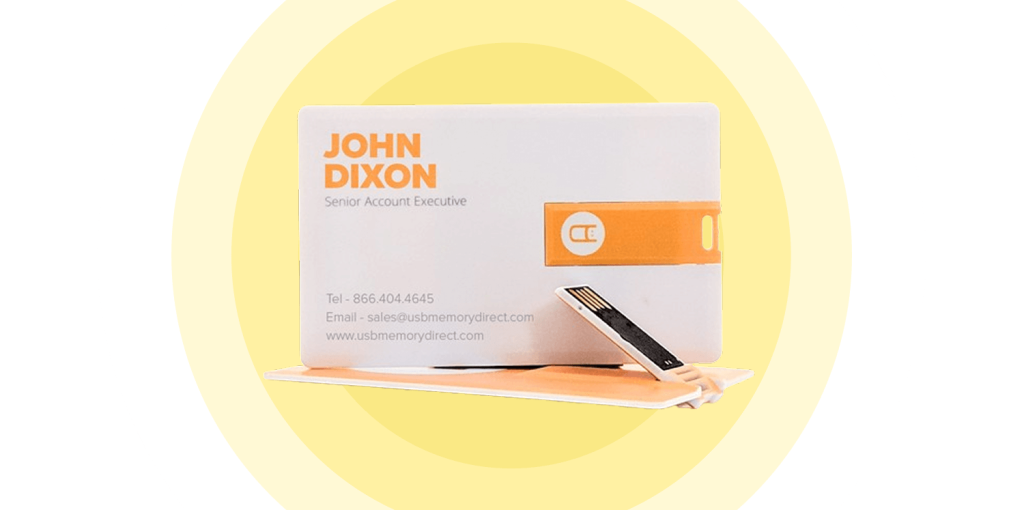
Source: USBMemoryDirect
These are actual USB drives shaped like business cards. When plugged in, they can showcase your portfolio, presentation, or product demo. Think of it as a mini briefcase.
Pros:
- Large storage capacity.
- Highly customizable per recipient.
- Functional and reusable.
Limitations:
- Compatibility varies (USB-A vs USB-C).
- Susceptible to data corruption.
Top platforms to get started: Flashbay, Logotech
Estimated pricing: $5 to $15 each, depending on memory
3D Printed Business Cards
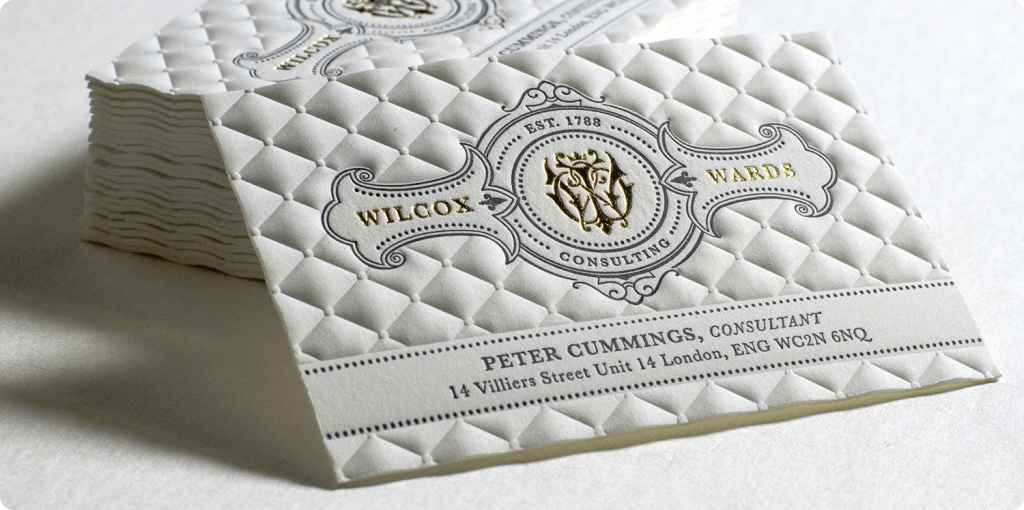
Source: JukeboxPrint
These cards use layers, 3D card designs, or embossing to create tactile experiences. Whether it’s a pop-up element, cut-out logo, or textured surface — this one is all about standing out in the hand.
Pros:
- Full brand customization.
- Creates emotional engagement.
Limitations:
- Bulkier.
- Fragile in some designs.
- Not always digital wallet-friendly.
Top platforms to get started: Jukebox Print, Elite Flyers
Estimated pricing: $5 to $15 per card, depending on complexity
Eco-Friendly Alternatives to Traditional Business Cards
If your brand revolves around nature, wellness, handmade goods, or simply cares about minimizing waste, these business card alternatives may be just what you’re looking for.
Plantable Business Cards
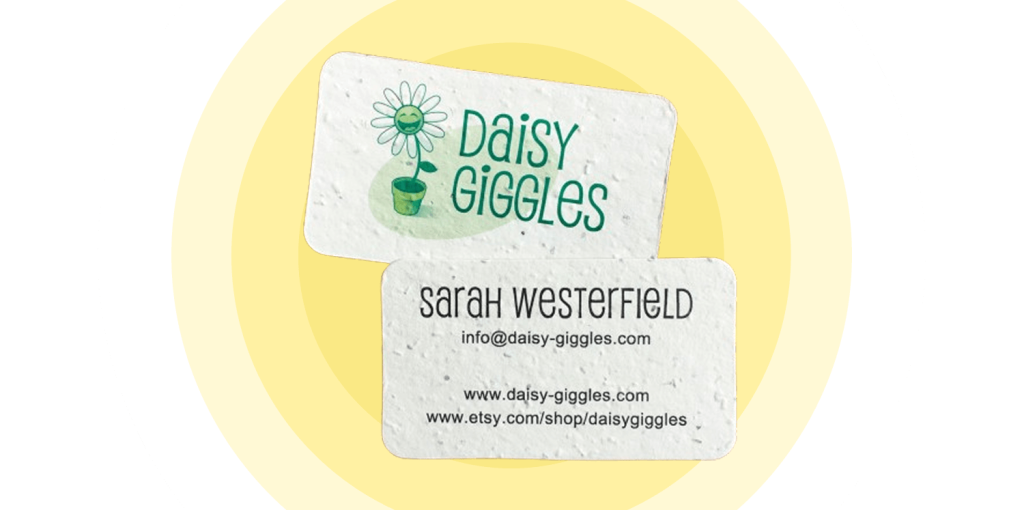
Source: Etsy
Plantable business cards are made from biodegradable seed paper, allowing recipients to plant the card in soil and grow wildflowers, herbs, or even vegetables.
Pros:
- Commitment towards sustainability: They showcase your commitment to nature while symbolizing growth and renewal.
- Memorable experience.
Limitations:
- Care requirements: Recipients must follow specific planting instructions, which may deter some users.
- Higher production costs.
Top platforms to get started: Botanical PaperWorks, CustomEarthPromos, LittleGreenPaperShop
Estimated pricing: $0.50 to $5 per card, depending on seed type, card design, and quantity
Recycled Fabric Cards
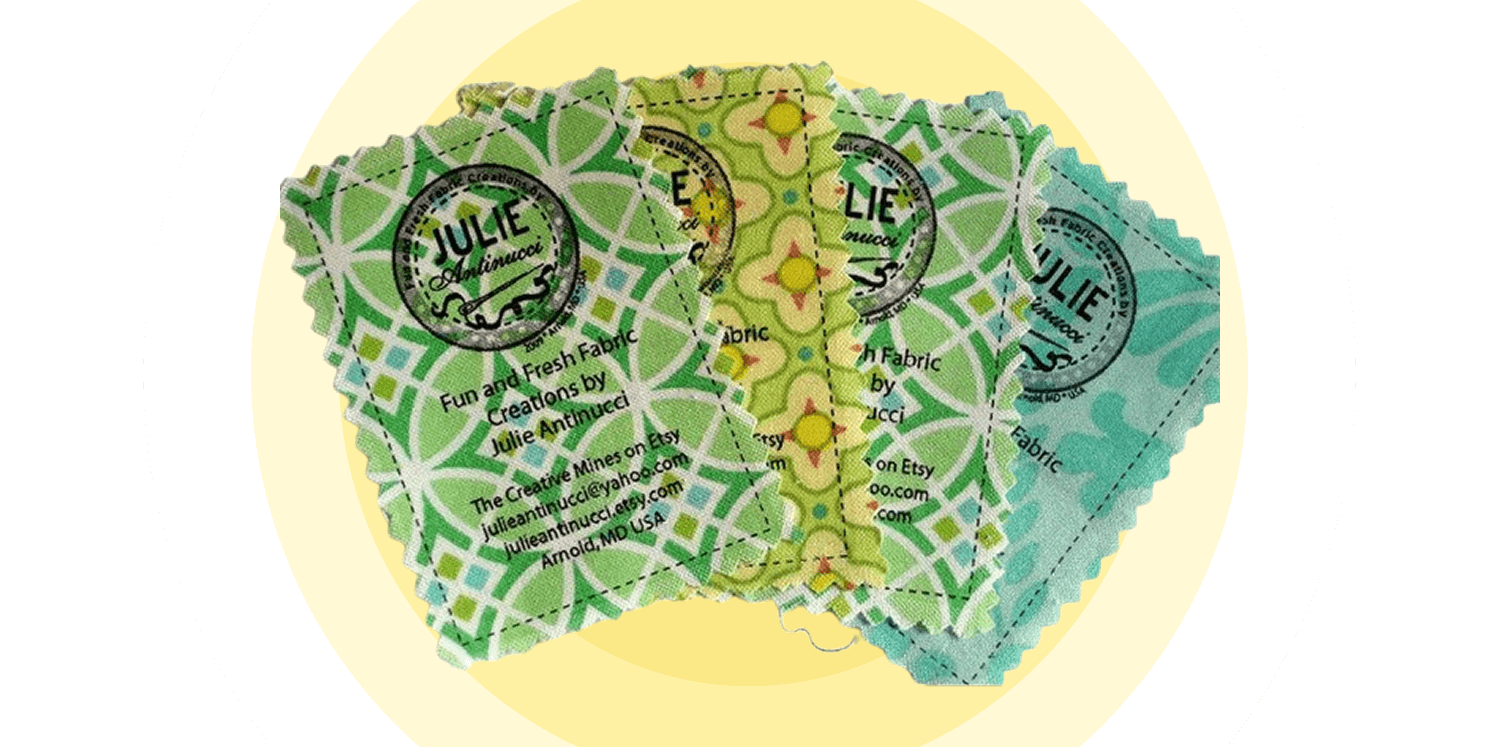
Source: Pinterest
These unique business card alternatives are made from old textiles, transforming waste into something beautiful and functional. With a soft, fabric-like texture, these cards feel unique and visually stand out from the crowd.
Pros:
- Soft and unique texture.
- Long-lasting durability.
- Eco-conscious branding.
Limitations:
- Non-traditional appearance: In formal or corporate settings, fabric business cards might not align with traditional professional expectations.
Top platforms to get started: Moo, EcoEnclose
Estimated pricing: $4 to $8 per card
Cork or Wooden Business Cards
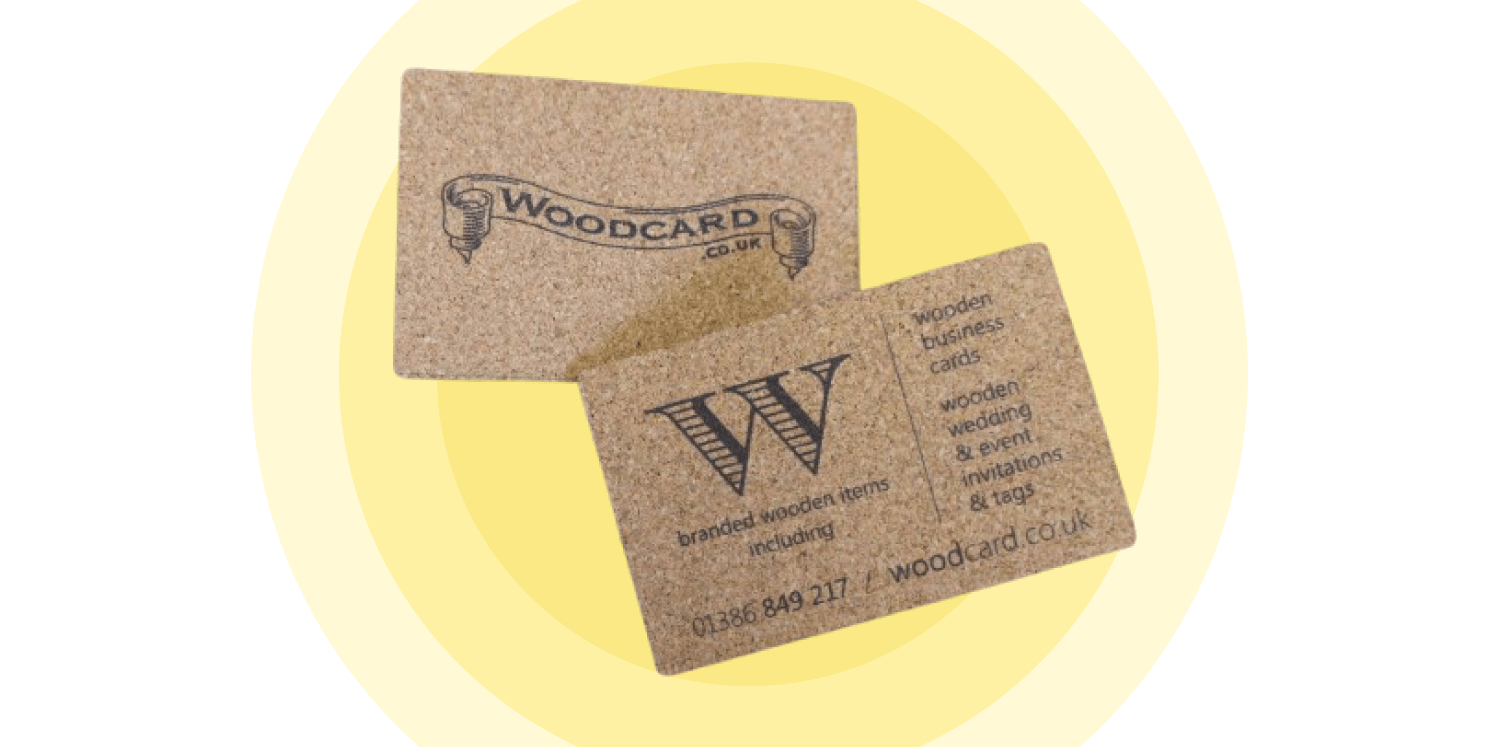
Source: WoodCard
Made from natural cork or sustainably harvested wood, these cards are sturdy, textured, and radiate earthy charm. A physical card that feels like no other.
Pros:
- Standout branding: A wooden card communicates thoughtfulness and premium branding.
- Biodegradable material: These are solid business card options that won’t sit in landfills.
- Durability and water resistance.
Limitations:
- Not ideal for mass sharing: They’re bulkier and more expensive, limiting scalability.
- Fragility with excessive bending.
Top platforms to get started: Jukebox Print, GreenerPrinter, Print Peppermint
Estimated pricing: $3 to $6 per card
Wax-Coated Fabric Cards
Combining eco-materials with resilience, wax-coated fabric cards are both water-resistant and durable while still offering an eco-conscious look and feel.
Pros:
- Tactile and unique feel: A soft, waxy finish gives them an upscale impression.
- Sustainable fabric options.
Limitations:
- Bulkier than traditional cards: Can be less wallet-friendly.
Top platforms to get started: Etsy, Printful
Estimated pricing: $4 to $8 per card
Functional Objects Used as Business Cards
Functional business card objects, such as business cards, offer a modern alternative for professionals in the creative, lifestyle, or beverage industries. If you want to make a lasting impression and offer something your contacts will use, this category of business card alternatives is for you.
Bottle Opener Business Cards
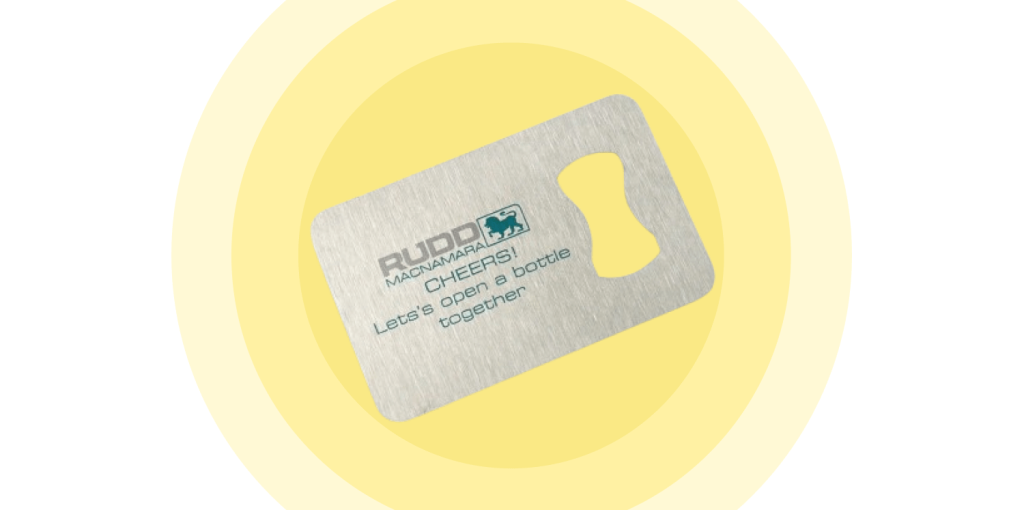
Source: BeerBranding
Typically made from metal or plastic, these are credit card-sized bottle openers with your branding and contact info engraved or printed on them.
Pros:
- Extended brand exposure: People use bottle openers frequently, keeping your brand visible.
- Durable and long-lasting: Sturdy material ensures they won’t wear out quickly.
Limitations:
- Bulkier and heavier than paper cards.
- Not suitable for all industries or networking environments.
Top platforms to get started: MyMetalBusinessCard, Merchfactory, MetalicCards
Estimated pricing: $1.50 to $3.00 per item
Coaster Business Cards
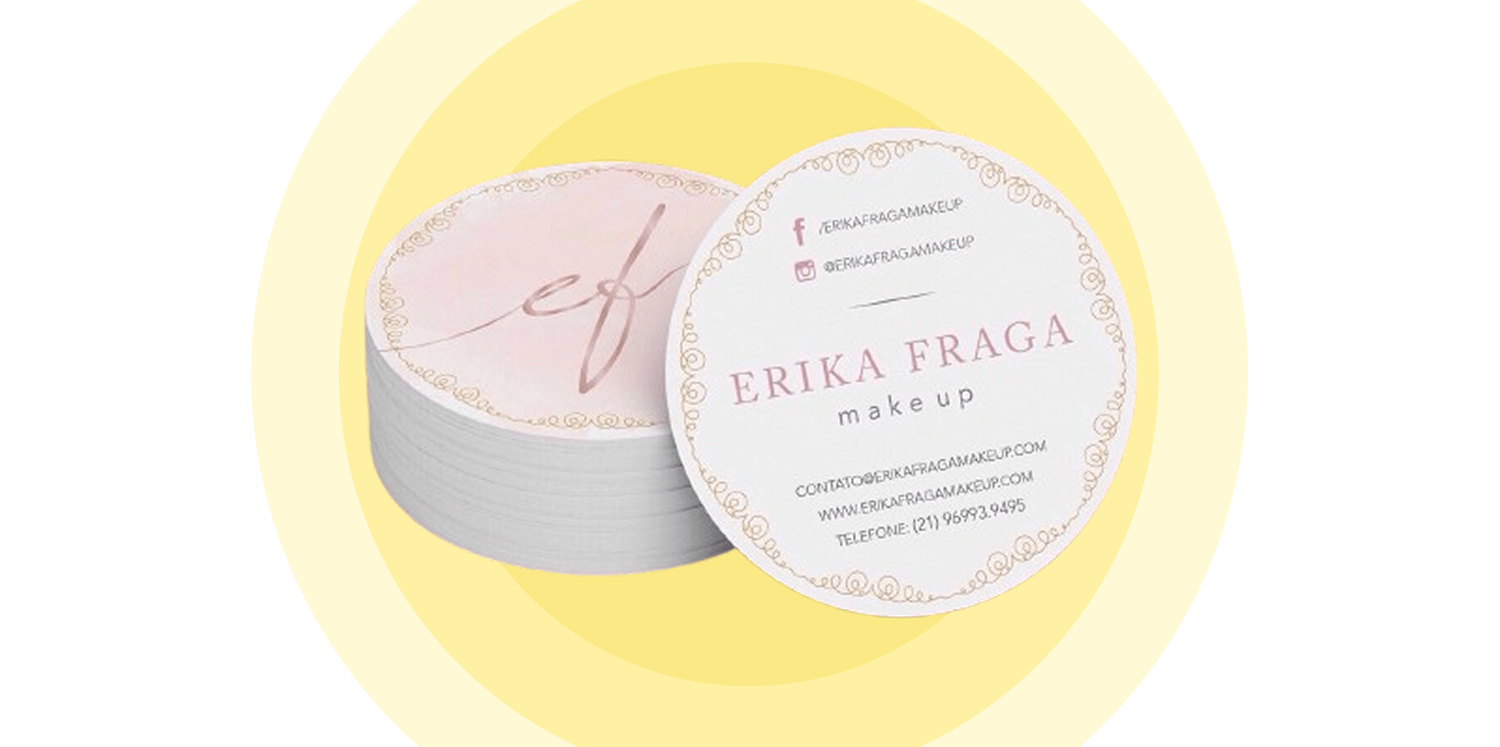
Source: StudioBlogDesign
These are actual drink coasters printed with your branding and contact details. Ideal for cafes, restaurants, or casual networking events.
Pros:
- Increased brand visibility: Regular use reinforces brand recognition.
- Multi-use value.
- Wide range of styles: From cardboard to cork or even reusable silicone.
Limitations:
- Limited shelf life: Especially for paper coasters that degrade with moisture.
Top platforms to get started: Vistaprint, Moo
Estimated pricing: $1 to $4 per card
Magnet Cards
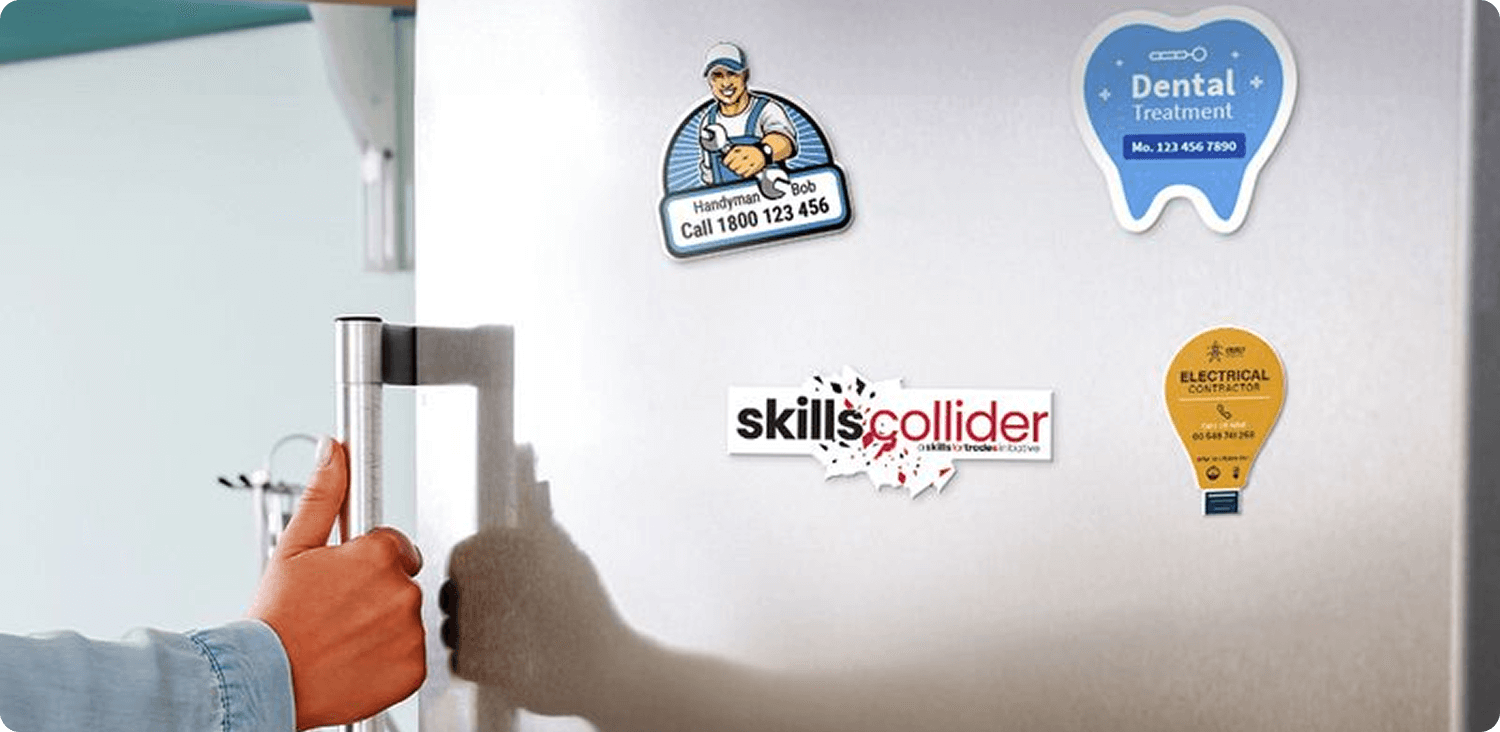
Source: Inteliprint
Stick them on a fridge, cabinet, or whiteboard — magnet cards keep your branding on display 24/7.
Pros:
- Long-lasting exposure: Rarely discarded, unlike traditional paper cards.
- Great for service-based businesses (cleaning, plumbing, etc.).
Limitations:
- Higher production costs.
- May not be suitable for luxury or formal branding.
Top platforms to get started: VistaPrint, 123 Print
Estimated pricing: $1 to $3 per card
Keychain Cards
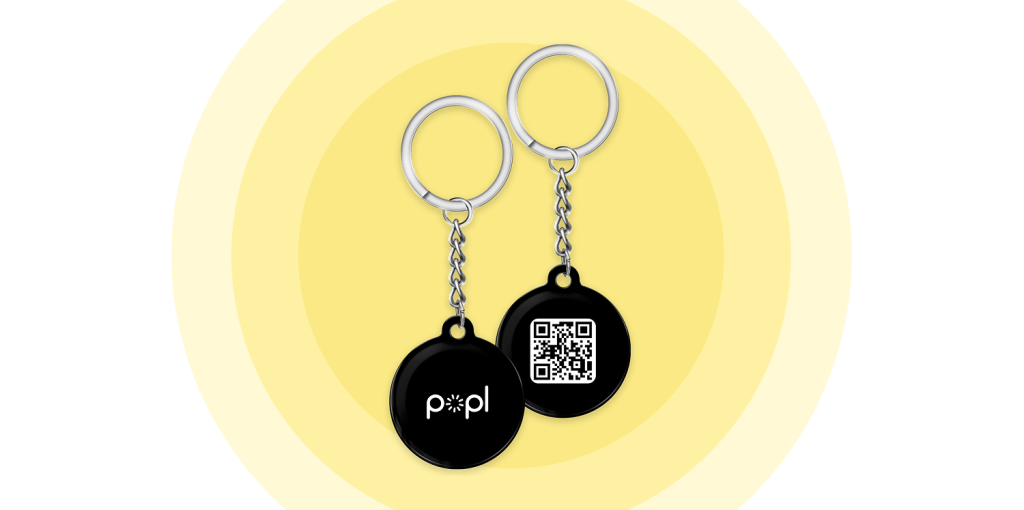
Source: Popl
Compact and functional, keychain cards hold your branding in a space that’s constantly carried.
Pros:
- Daily use: People always carry keys, so these cards stay visible.
- Easy access: Great way to exchange contact information on the go.
Limitations:
- Limited space for text or logos.
- Can be pricey if not ordered in bulk.
Top platforms to get started: Zazzle, Popl
Estimated pricing: $1 to $18 per keychain
Metal Business Cards
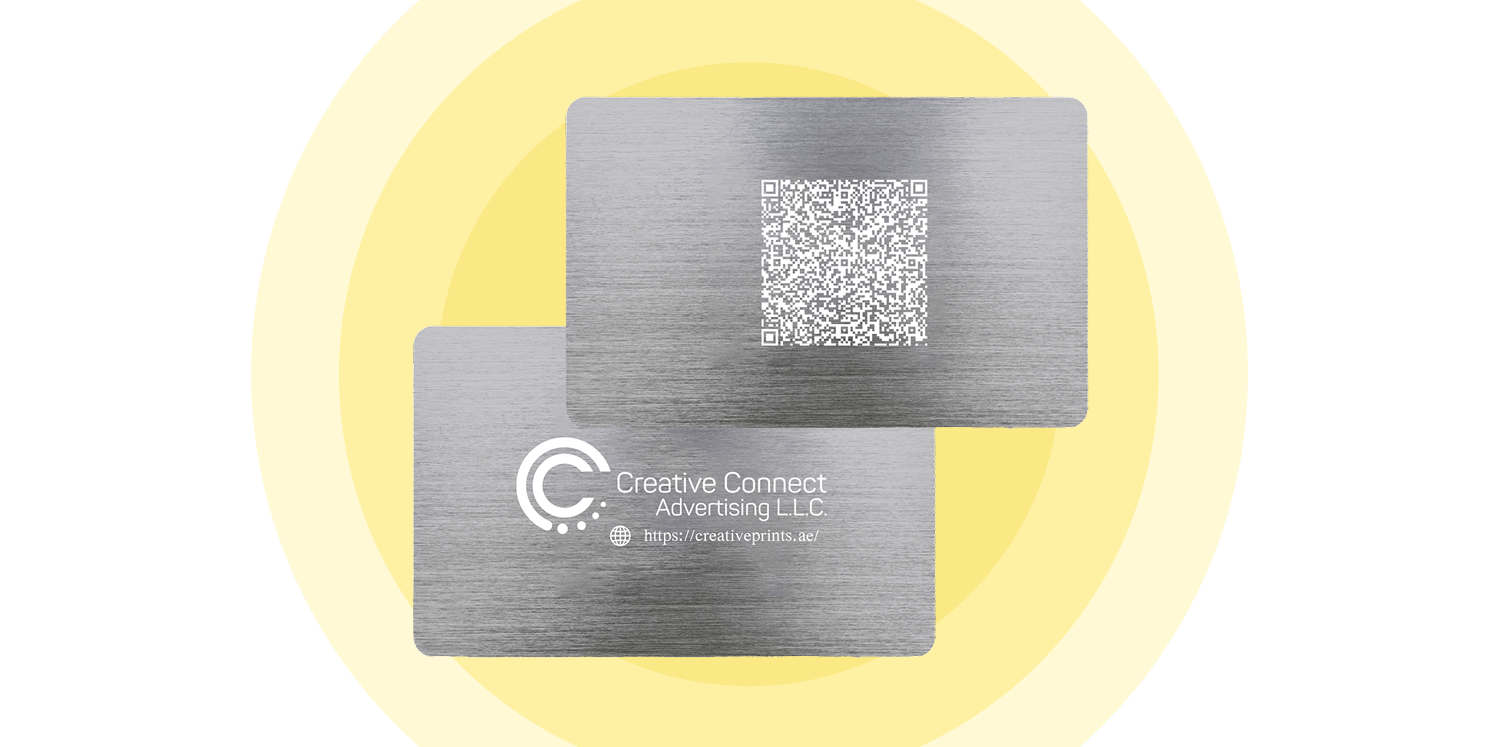
Source: CreativePrints
Modern and luxurious, these cards are crafted from stainless steel or aluminum and often feature custom laser-etched branding.
Pros:
- Premium look: Elevates brand image instantly.
- Extreme durability.
Limitations:
- Expensive per unit.
- Heavier and harder to carry in bulk.
Top platforms to get started: MyMetalBusinessCard
Estimated pricing: $15 to $49 per card
Wristbands as Business Cards
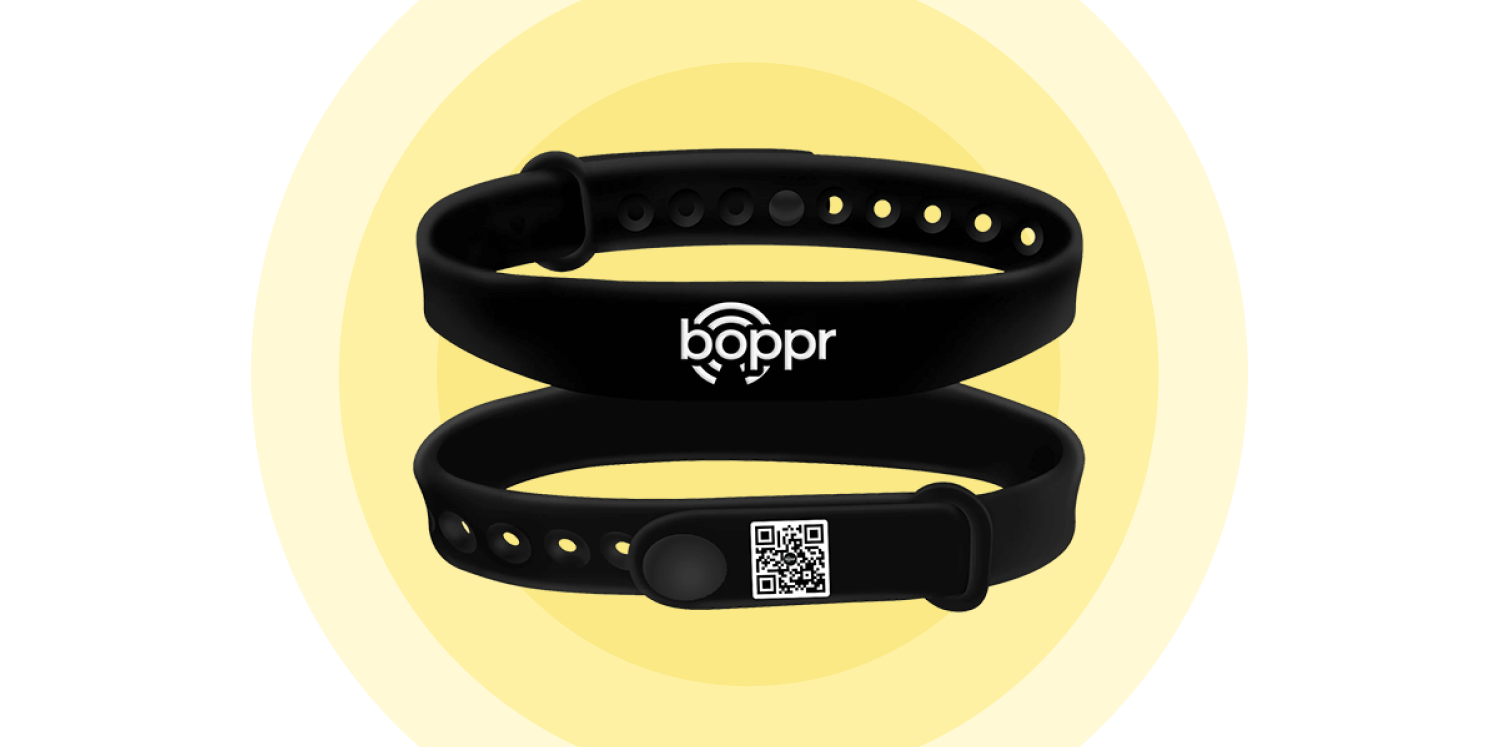
Source: Boppr
These silicone wristbands contain your contact info or a scannable QR code.
Pros:
- Easy distribution at events.
- Reusable and visible.
Limitations:
- Ink could smudge and become illegible.
- Not ideal for formal contexts.
Top platforms to get started: Popl, Blk. Cards
Estimated pricing: $20 to $30
Stickers as Business Cards
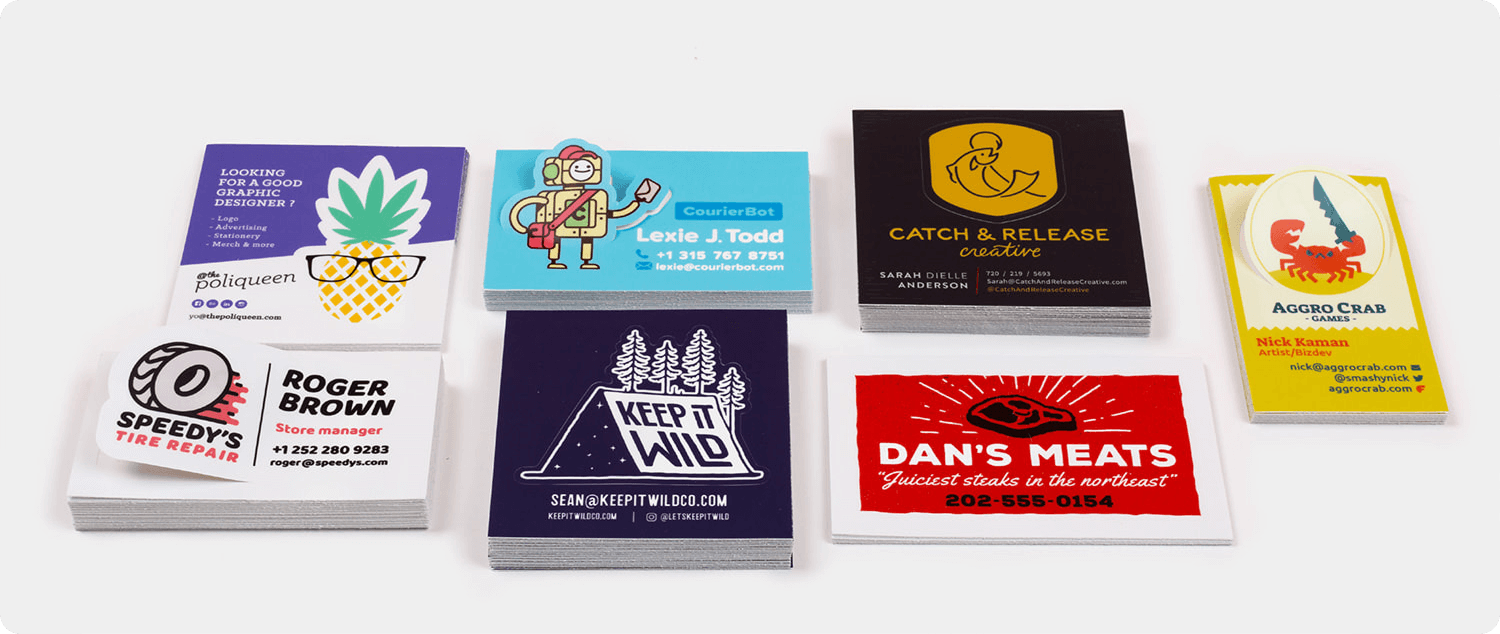
Source: Stickermule
More of a guerrilla-style tactic, stickers with contact details or scannable links can be stuck to laptops, water bottles, or notebooks.
Pros:
- Wide distribution: Stick them anywhere for unexpected exposure.
- Fun branding: Great for youthful or casual brands.
- Custom shape options.
Limitations:
- One-time use.
- Premium materials increase cost.
Top platforms to get started: Vistaprint, Apprintable
Estimated pricing: $1 to $5 per card
Creative & Conversation-Starting Cards
These are the cards that aren’t really cards. They’re art pieces, edible novelties, or collectibles. If your primary goal is to initiate a conversation and make a lasting impression rather than distribute widely, these are your go-to creative business card alternatives.
Edible Business Cards
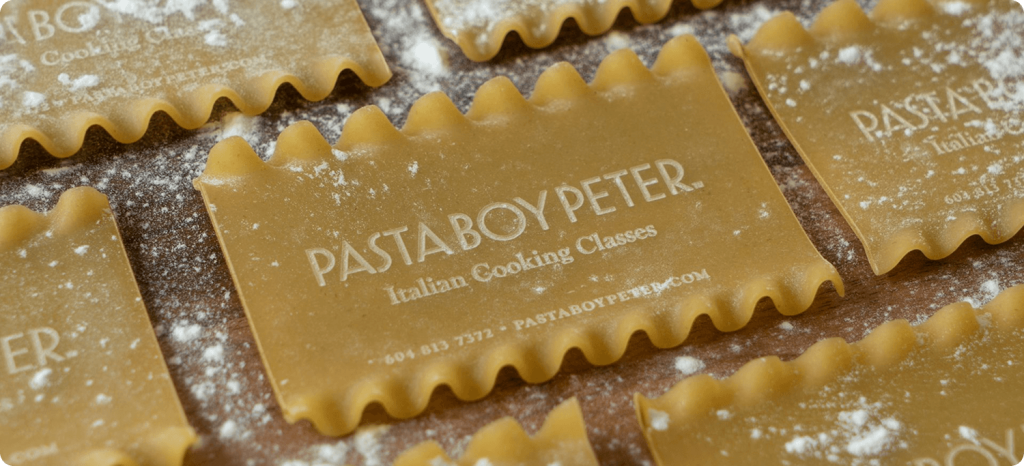
Source: Zapped
Business edible cards made from cookies, chocolate, or even dried fruit. They often have edible ink printed on top with your contact details.
Pros:
- Sensory marketing: Combines taste and branding.
- Immediate engagement: Hard to ignore something you can eat.
- Fun and unexpected: Great for food or lifestyle brands.
Limitations:
- Higher production costs.
- Limited shelf life.
- Not suitable for all diets.
Top platforms to get started: Edible Print Company, Frostino, Custom Edibles
Estimated pricing: $5 to $10 per card
Fortune Cookie Business Cards
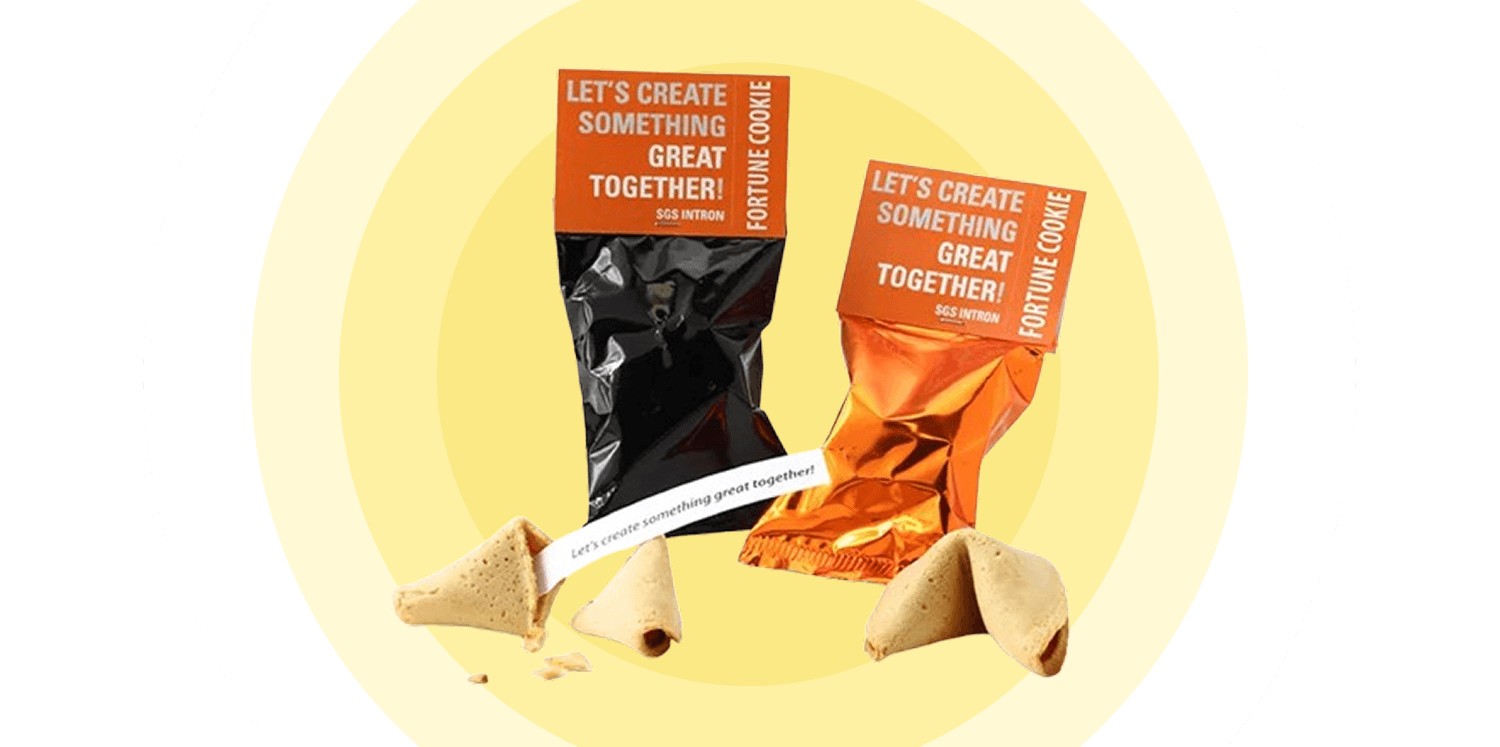
Source: Worldofcookies
Your message or contact info comes printed inside the fortune cookie.
Pros:
- Unique presentation: Delivers a sense of mystery and surprise.
- Budget-friendly in bulk creation.
Limitations:
- Easily breakable.
- Short lifespan.
Top platforms to get started: Custom Fortune Cookie Factory
Estimated pricing: $1 per cookie
Lego Business Cards
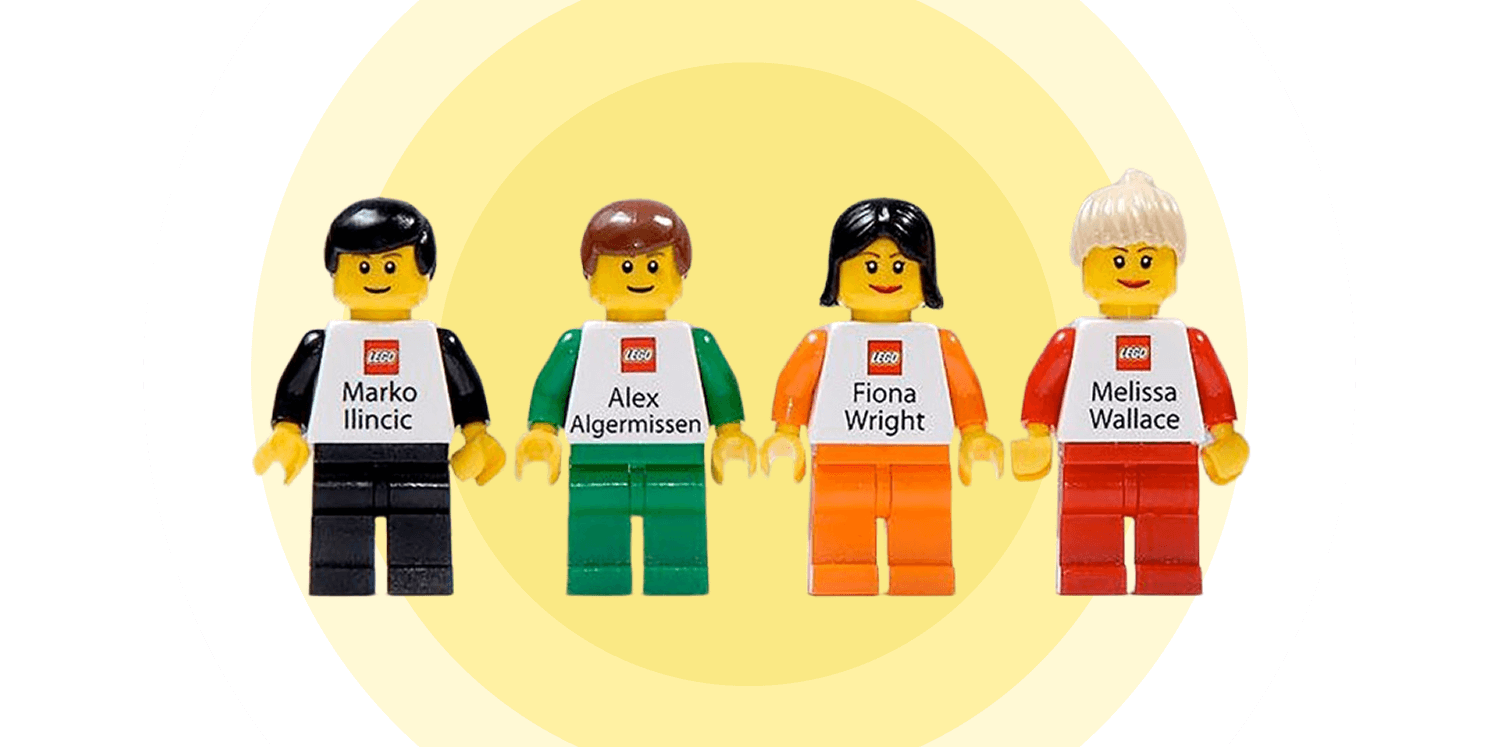
Source: CleverBusinessCards
Real Lego pieces personalized with names and logos.
Pros:
- Collectible value: Hard to throw away.
- Memorable and playful.
- Strong brand identity if you’re in design or tech.
Limitations:
- Costly and impractical for mass sharing.
Top platforms to get started: Lego (limited availability)
Estimated pricing: $10 to $20 per card
Matchbox Business Cards
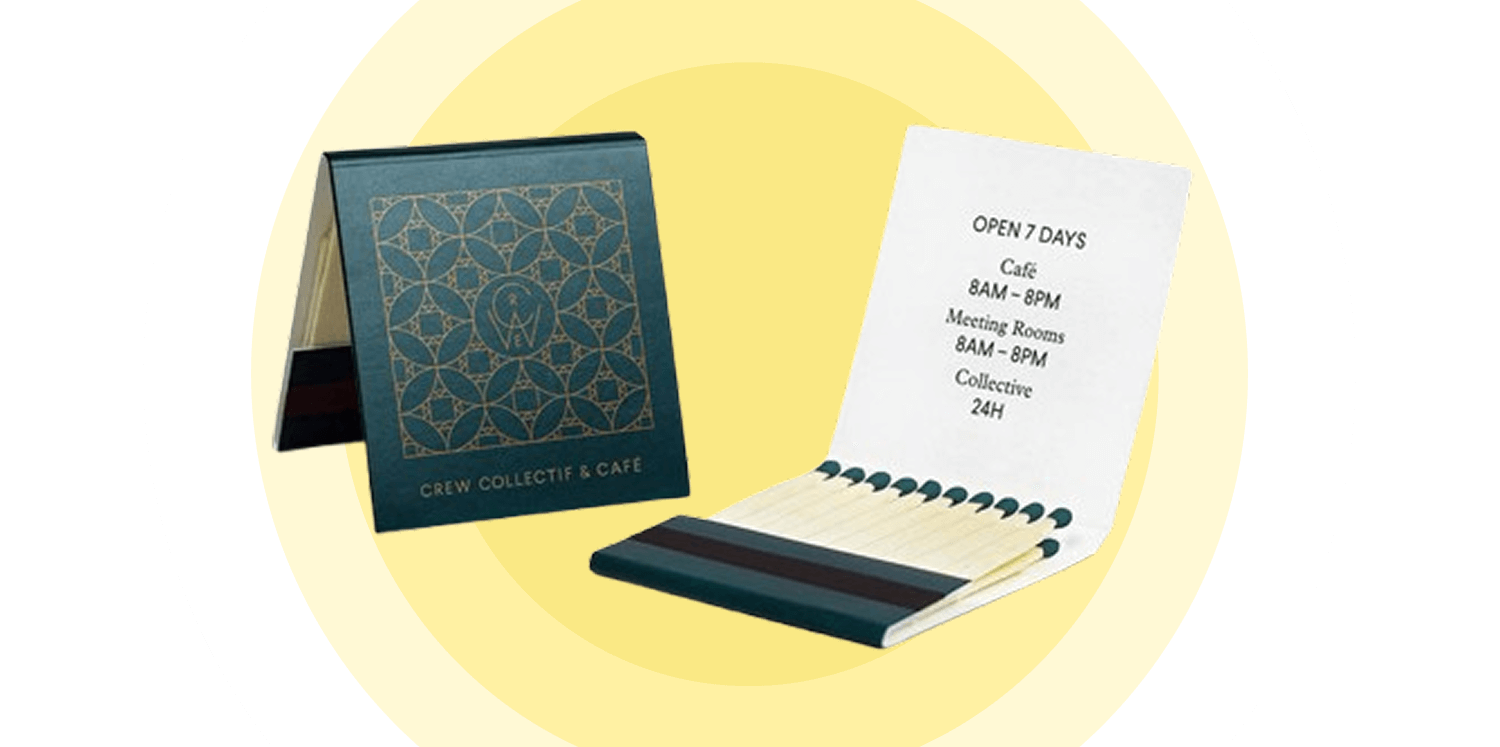
Source: VanessaPepin
Printed matchboxes featuring branding inside and out.
Pros:
- Multi-purpose.
- A valuable tool for specific industries (e.g., hospitality).
Limitations:
- Flammable item regulations may apply.
Top platforms to get started: Zazzle
Estimated pricing: $10 to $50 per box
Bookmark Business Cards
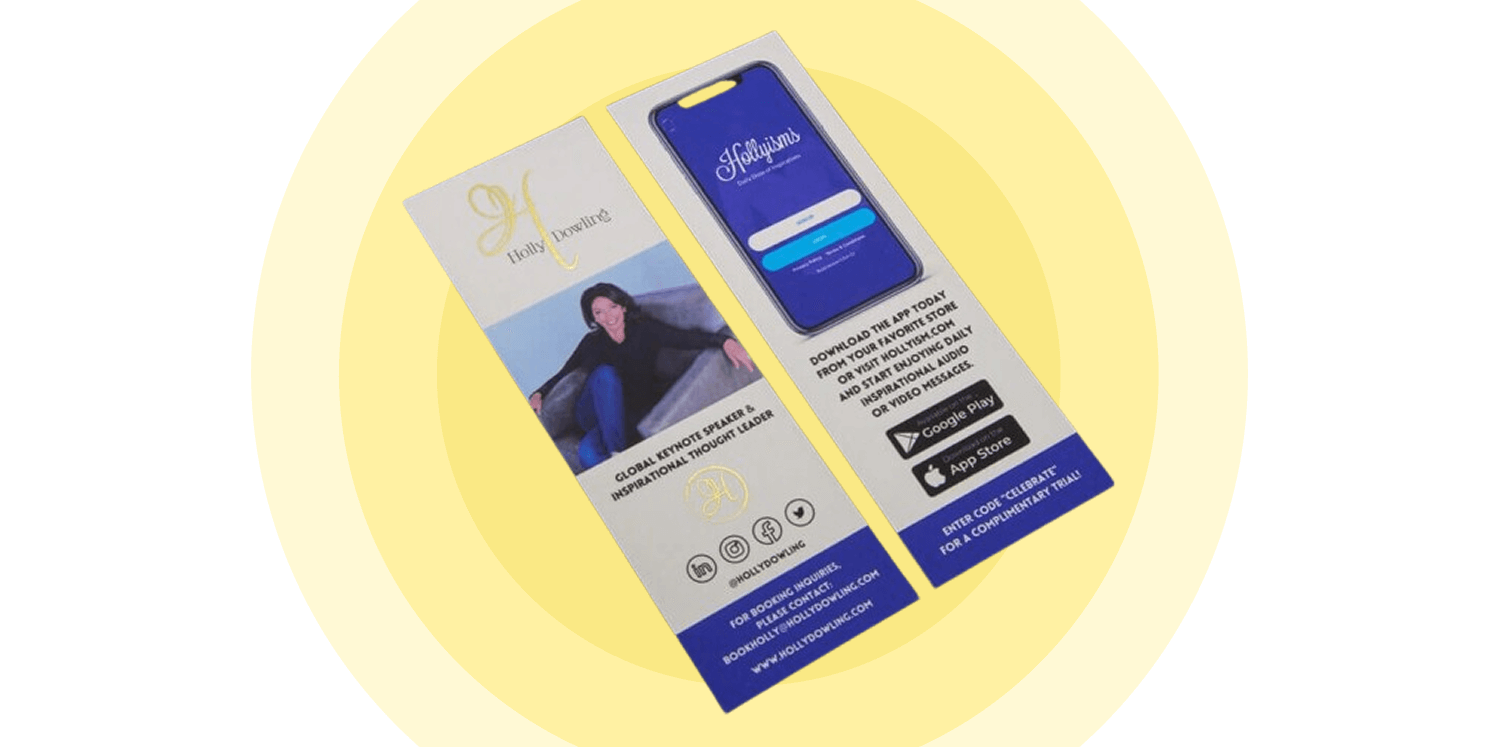
Source: AxiomPrint
Slim, vertical cards that double as bookmarks.
Pros:
- Useful and long-lasting.
- Great for education or publishing brands.
Limitations to keep in mind:
- Larger than typical cards.
Top platforms to get started: Zazzle, Vistaprint
Estimated pricing: $3 to $15 per card
Let’s wrap it up. In 2026, there’s no reason to settle for a standard paper card. You now have access to:
- Eco-friendly business card options that align with sustainability goals.
- Functional and interactive formats that offer a unique way to exchange contact information.
- Creative ways to leave a lasting impression and get people talking.
Whether your focus is branding, making a personal connection, or standing out at your next networking event, there’s modern business card alternative ideas to suit your needs. And if you want to explore the digital route with full customization and top-tier actionable tools, Wisery has you covered.
Try Wisery now and upgrade your networking game.

Viktoria is a Marketer at Wisery. When she’s not creating engaging content or sharing brand values, you’ll find her reading a good book or chilling with her cats.